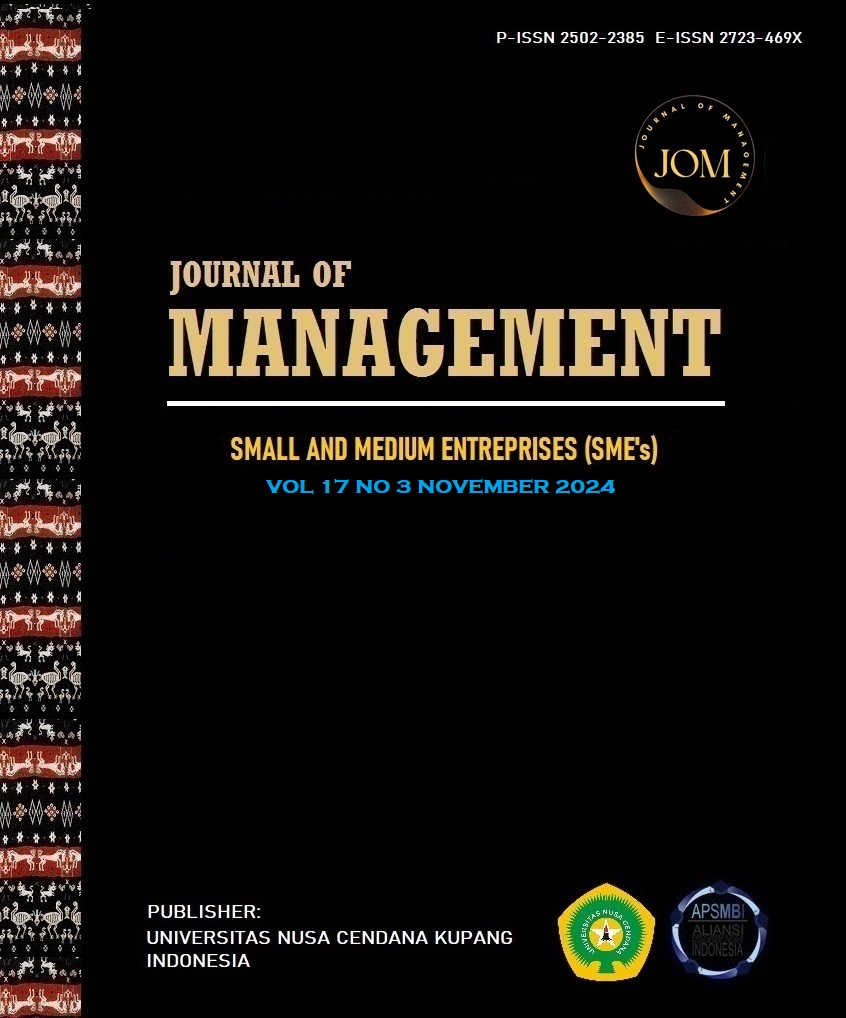ANALISIS PENERAPAN STANDAR OPERASIONAL PROSEDUR (SOP) DALAM MENINGKATKAN EFEKTIFITAS KINERJA PEGAWAI PADA KANTOR CAMAT MA’U KABUPATEN NIAS
Abstract
Standard Operating Procedures are guidelines or references for carrying out work tasks under the functions and performance assessment tools of government agencies. This research aims to analyze the application of standard operating procedures (SOP) in improving the effectiveness of employee performance at the Ma'u District Head Office, Nias Regency. This research was carried out as a qualitative type of research with a descriptive approach because this type of research aims to describe and analyze phenomena, events or social activities that are occurring currently at the Mau Subdistrict Office, Nias Regency. The results of this research are: SOP implementation has been implemented but in this case, efficiency has not yet been implemented according to existing Administrative Service SOPs in carrying out duties and responsibilities, so processing letters by the public takes too long. In this case, the obstacles are due to work delays, discrepancies, non-compliance with existing procedures, and limited and delayed information. Efficiency and consistency are necessary in implementing SOPs to maximize existing work.
Keywords: Standard Operating Procedures; Employee Effectiveness; Employee Performance
Downloads
References
Asif, M., Khan, M. N., Tiwari, S., Wani, S. K., & Alam, F. (2023). The Impact of Fintech and Digital Financial Services on Financial Inclusion in India. Journal of Risk and Financial Management, 16(2). https://doi.org/10.3390/jrfm16020122
Bartlett, R., Morse, A., Stanton, R., & Wallace, N. (2022). Consumer-lending discrimination in the FinTech Era. Journal of Financial Economics, 143(1), 30–56. https://doi.org/10.1016/j.jfineco.2021.05.047
Chang, V., Baudier, P., Zhang, H., Xu, Q., Zhang, J., & Arami, M. (2020). How Blockchain can impact financial services – The overview, challenges and recommendations from expert interviewees. Technological Forecasting and Social Change, 158(June), 120166. https://doi.org/10.1016/j.techfore.2020.120166
Deng, L., Lv, Y., Liu, Y., & Zhao, Y. (2021). Impact of fintech on bank risk-taking: Evidence from China. Risks, 9(5). https://doi.org/10.3390/risks9050099
Gancarczyk, M., Łasak, P., & Gancarczyk, J. (2022). The fintech transformation of banking: Governance dynamics and socio-economic outcomes in spatial contexts. Entrepreneurial Business and Economics Review, 10(3), 143–165. https://doi.org/10.15678/EBER.2022.100309
Mlambo, C., & Msosa, S. K. (2020). The effect of financial technology on money demand: Evidence from selected African states. International Journal of Economics and Business Administration, 8(1), 366–373. https://doi.org/10.35808/ijeba/430
Msomi, T. S., & Nzama, S. (2022). Financial literacy and SME loan repayments in South Africa during the COVID-19 era. Investment Management and Financial Innovations, 19(4), 113–121. https://doi.org/10.21511/imfi.19(4).2022.09
Owusu, J., Ismail, M. Bin, Osman, M. H. B. M., & Kuan, G. (2019). Financial literacy as a moderator linking financial resource availability and SME growth in Ghana. Investment Management and Financial Innovations, 16(1), 154–166. https://doi.org/10.21511/imfi.16(1).2019.12
Purnamasari, P., Pramono, I. P., Haryatiningsih, R., Ismail, S. A., & Shafie, R. (2020). Technology Acceptance Model of Financial Technology in Micro, Small, and Medium Enterprises (MSME) in Indonesia. Journal of Asian Finance, Economics and Business, 7(10), 981–988. https://doi.org/10.13106/jafeb.2020.vol7.no10.981
Shah, S. Z. A., Anwar, M., & Hussain, C. M. (2021). Top managers’ attributes, innovation, and the participation in China–Pakistan Economic Corridor: A study of energy sector small and medium-sized enterprises. Managerial and Decision Economics, 42(2), 385–406. https://doi.org/10.1002/mde.3242
Stankevičienė, J., & Kabulova, J. (2022). Financial technology impact on stability of financial institutions. Technological and Economic Development of Economy, 28(4), 1089–1114. https://doi.org/10.3846/tede.2022.17093
Su, F., & Xu, C. (2023). Curbing credit corruption in China: The role of FinTech. Journal of Innovation and Knowledge, 8(1), 100292.
https://doi.org/10.1016/j.jik.2022.100292
Tan, G. K. S. (2022). The “fintech revolution” is here! The disruptive impact of fintech on retail financial practices. Finance and Society, 8(2), 129–148.
https://doi.org/10.2218/finsoc.7763
Xiang, D., Zhang, Y., & Worthington, A. C. (2021). Determinants of the use of fintech finance among chinese small and medium-sized enterprises. IEEE Transactions on Engineering Management, 68(6), 1590–1604.
https://doi.org/10.1109/TEM.2020.2989136
Yang, X., Yang, J., Hou, Y., Li, S., & Sun, S. (2023). Gamification of mobile wallet as an unconventional innovation for promoting Fintech: An fsQCA approach. Journal of Business Research, 155(PA), 113406.
https://doi.org/10.1016/j.jbusres.2022.113406

 Noni Netralis Gulo(1*)
Noni Netralis Gulo(1*)



